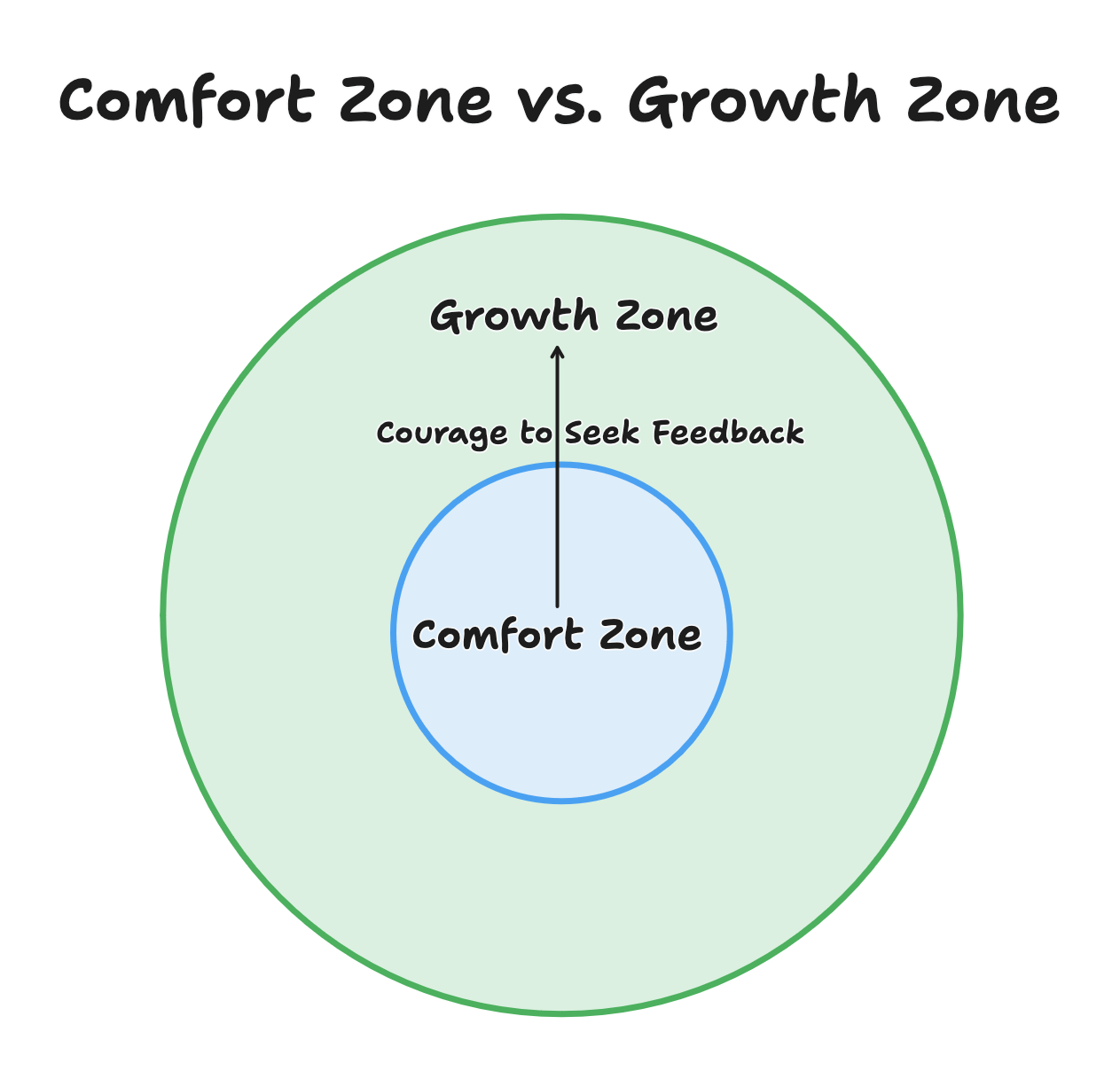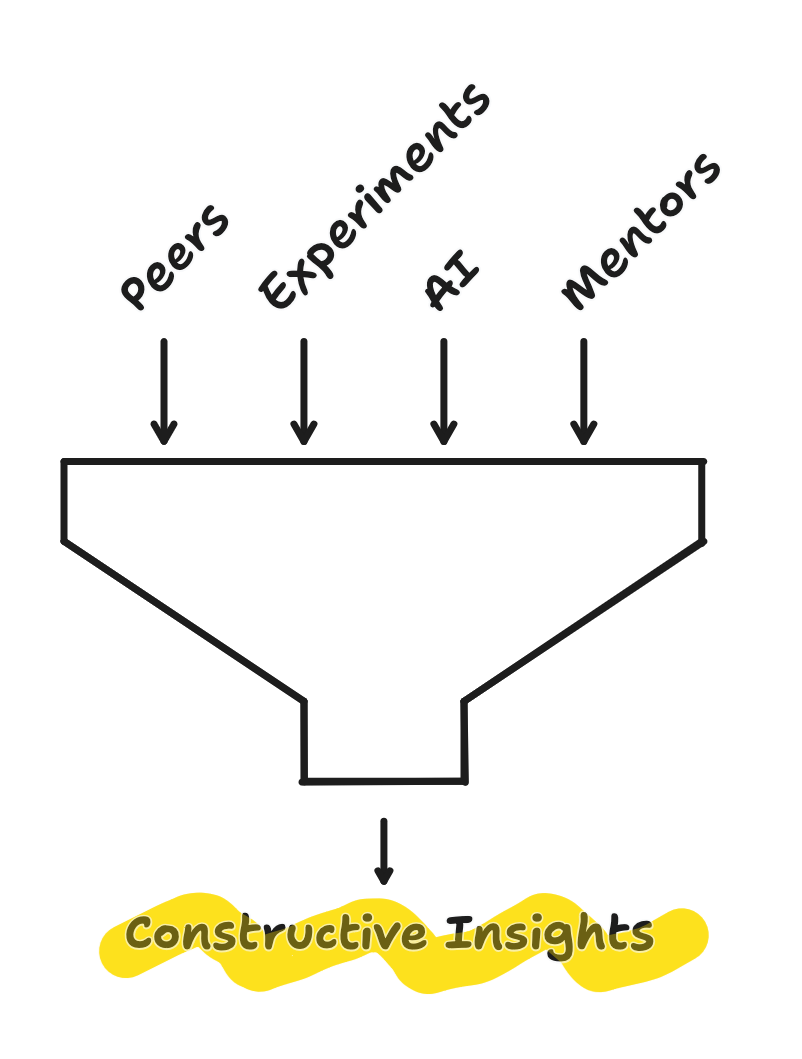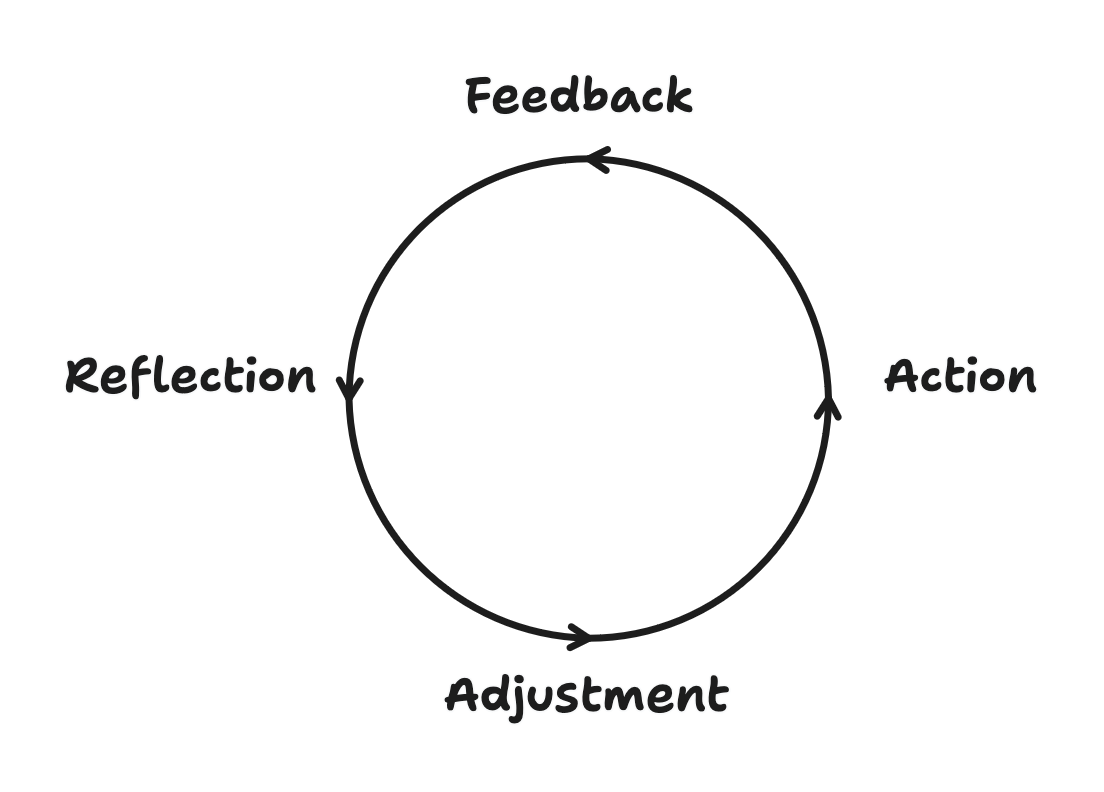Stop Hiding From Feedback
Feedback isn’t just helpful, it’s one of the greatest tools for growth. Input from peers, mentors, and experts plays a crucial role in your journey to mastery. When I was younger, I failed to grasp the importance of feedback loops. I dreaded test results, code reviews, and design critiques, missing out on many learning opportunities. I hope this post will convince you to embrace criticism.
Why I Care about Feedback
Our days are packed. When you add kids, and other responsibilities to the mix, your available time is slim to none. This leaves little room to dedicate undivided attention to mastering anything. That doesn’t mean you should give up. On the contrary, I urge you to discover how to be the most effective with the time you have. I reviewed books, papers, and lectures to learn how mastery is achieved, and found key behaviors that could help maximize your effort.
While there are several factors that can help your growth and path to proficiency, feedback comes up again and again. It’s one of the most challenging parts because it can disrupt the perception you have of yourself. It’s also one of the most powerful ingredients, as it supports your deliberate practice by attacking the weakest areas.
I care about feedback because it grounds me to reality, and only then I learn what to focus on next.
But what’s stopping you from seeking feedback?
What’s Holding You Back
Shane Parrish offers a good explanation in Clear Thinking. He calls it the “Ego Default”. This is a default behavior in response to anything undermining our sense of self-worth. Feedback directly critiques your work and can reveal truths you weren’t prepared for. Most of us have experienced this at least once in our life in school or work. That experience has shown us how uncomfortable it is to receive feedback.
The idea of how good we are at something is now under threat. Most people avoid this emotional rollercoaster, and live in the illusion of their level of mastery (likely as a defense mechanism). You might also be on the other side of the spectrum. You have impostor syndrome and are afraid that any feedback might confirm what you always feared. Fear is what governs a fixed mindset, while motivation to improve drives a growth mindset.
To support this, I found some research calling out the contrast between self-efficacy (i.e. the belief in your ability to succeed in a specific situation or accomplish a task) and feedback seeking. Individuals with low self-efficacy often avoid feedback out of fear of judgment and appearing incompetent. Things get more complex for individuals with high self-efficacy and it heavily depends on their mindset. Some feel at ease asking for feedback, as they don’t find the negative one will affect their ego or reputation. Others undervalue it, as they find it less useful to their already high performance.
I hope this gives you some reassurance that you’re not alone. Your feelings towards feedback are normal. Let’s explore where to go from here.
It Takes Courage, There is No Workaround
Without feedback, how do you know if you’re as good as you think—or worse than you fear? You can only rely on your perception or intuition to assess the quality of your work compared to others. That feels unreliable and biased. You might think you’re better than what you’re comparing yourself to, or you might see a masterpiece and conclude you’re never going to reach that level, so you might not start at all.

This creates an interesting problem. If you never receive feedback on your work, you never know if you’re as good as you think you are. You also never know if that unbearable feeling of incompetence is well placed.
I’m afraid there is no workaround. Find the courage to overcome this. If you’re not mentally prepared, feedback can feel brutal. Blinded by your irrational reaction, you won’t extract the real value of criticism and praise. Any time something threatens your self-efficacy, you might retreat to your safe place and protect the idealized image you hold of yourself. That’s a normal instinctual reaction, but there are ways to manage it (we will explore how later).
How do you get over your defense mechanism and seek feedback from others? Why would you even look for uncomfortable criticism of your work?
Understanding the Power of Feedback
I find that reasoning at the extremes might land the message more effectively. Imagine working on a canvas, endlessly refining it, only to discover years later that your work is far from exceptional. A single critique early on could have uncovered what you were missing and saved years of trial and error.
What if, instead of working in the shadows, you worked in the open? What if you waited a month to get feedback instead of a decade? In Mastery, Robert Green is effective in highlighting the importance of apprenticeship. A place where your views and knowledge are put to a test, your work is continuously criticized, and you’re focused on your weaknesses rather than bathe in a misplaced feeling of mastery.
Some of history’s greatest minds sought feedback consistently and were focused on their learning journeys. Take Leonardo Da Vinci, at the age of 14 he joined the workshop of Verrocchio, one of the greatest painters and sculptors of his time. He sought input from other bright contemporary artists and was able to leverage the apprenticeship to grow and become one of the most impressive individuals of his time (and some).
You might not be the next Leonardo Da Vinci and that’s OK. Whether you’re coding, writing, or leading a team, feedback is the bridge between where you are and where you want to be.
Does all Feedback Need to be Human sourced?
Human feedback is not the only way to improve and it can be complemented with non-human one. We live in an era where AI is omnipresent and can be used to your advantage. This can support a tight feedback loop and help you get started if you’re still hesitant to reach out to people.
If you go the AI route, you have to be willing to refine your prompts. These models are trained on a lot of existing information, you will likely get responses based on average results. If you’re behind the average, it will be help you get up to speed. In order to excel, I’m not confident in its ability to take you there. I recommend being open minded and giving it a try.
Like most things, it all depends on your context. If you’re trying to improve behaviors, peer feedback is the most impactful. If you’re trying to improve on your coding, use linters, write tests, check error logs, ask someone to review your code, or ask an AI to offer some guidance. The tighter the feedback loop, the quicker you can iterate and improve.
Don’t forget that one source of feedback should not exclude others. Any of these tools help best in conjunction with human input. If you balance this right, you can get a more complete picture with contextual insights from other people and quick iterations from tooling.
How to Stop the Misery
Until you sit down and think about what you’re so afraid of, you won’t be able to move forward. It all boils down to caring more about your growth than the vulnerability you feel exposing your work.
You can find examples everywhere, from accomplished people, to everyday life:
- Brandon Sanderson wrote over a dozen novellas before being published. Feedback from peers and editors helped improve his storytelling. He often recommends forming a writing group for this reason.
- Arnold Schwarzenegger often recounts how he’s not a self-made man and was supported and helped by many people in his life.
- Michael Jordan credited part of his success to his coach Phil Jackson’s feedback, even when it was rough.
- A manager adjusting his management style based on his team’s feedback.
- A teacher adjusting their methods based on student feedback.
- A startup founder constantly seeking feedback from early users to refine their product.
Be intentional about the type of feedback you’re looking for. No matter how harsh it can be, soak it all in and use it as a great opportunity to learn what to focus on next.
There’s no shortcut. Take a step back and be open to criticism. Robert Green comes in handy once more here:
“Get them [Masters] to give you the proper challenges that will reveal your strengths and weaknesses and allow you to gain as much feedback as possible, no matter how hard it might be to take. Accustom yourself to criticism. Confidence is important, but if it is not based on a realistic appraisal of who you are, it is mere grandiosity and smugness.”
The last sentence reminds me of the results from the research mentioned earlier, where some people with high self-efficacy dismiss feedback as unnecessary. This is where self-efficacy might be misplaced. And this is also where you don’t want to be.
Filter out the Bad
Is all feedback equally good? Should I listen to everything anyone around me is saying?
The short answer is no to both. You should ask for feedback from people you trust. I recommend asking your manager, your teachers, your peers, and direct reports. They have a different perspective on you and can provide a 360 view on your work.
Keep your circle small to avoid confusing or overwhelming information, prioritize people who are subject-matter experts, have demonstrated success in similar projects, or are able to provide constructive and actionable insights.

If you don’t know where to start, look for kind people in your life. Kind people are the ones you want feedback from, they will tell you things with honesty because they care. They won't sugar coat it just so they don't hurt your feelings. They understand the former is more important than the latter.
Sometimes you can’t control who’s going to give you feedback. Not everyone has your best interest at heart, you should weed these people out right away. Mean-spirited responses are easy to spot and simple to dismiss. Every once in a while, despite the abrasive or overly harsh tone, there might be some truth to the answers you receive. If you really value that specific person, remember that it’s not an assessment of you as a human being, but your work. Filter out the noise and extract the most important bits, throw away the rest.
For example, my early coding contributions were reviewed in a way that I found, at the time, abrasive. I took a deep breath and realized it wasn’t a personal attack. The reviewer was just getting to the point and all the feedback turned out to be quite valid. I learned how that person communicates and was able to focus on the important parts ever since.
Not all feedback is helpful. You can mitigate this by avoiding generic questions and digging into specifics. Whenever you see comments like “This could be better”, “I wouldn’t have gone this route”, ask follow up questions. Get to the bottom of it and if nothing useful comes out, you don’t have to keep it in consideration. Bias, overly harsh input, or non-expert sources are other examples of unhelpful feedback. They might even lead you in the wrong direction. This is where you have to learn how to take a step back and understand if what you’re hearing is aligned with your goals.
If after reading this you’re still unsure, start small and focus on advice that feels constructive and actionable rather than discouraging.
The Action Plan
Deep changes don’t happen overnight, but they have to start somewhere. Here’s an action plan to help evolve your mindset and propel your growth.
- Start Small: ask people you trust for informal feedback on smaller tasks. Get yourself comfortable with critique on minor work to build up confidence for more important ones.
- Before writing a 1000 page novel, write a small novella and look for input from other writers..
- Before doing a massive code refactor, start with a single package or file and seek other’s opinions.
- Before going from theory to experiment, ask someone to review your assumptions.
- Be Specific: asking for effective feedback is an art, based on the type of work being reviewed make sure you have pointed questions. Avoid asking for generic feedback and offer a template to guide your reviewers. A few examples:
- Is my test coverage sufficient? Did I miss any edge-case?
- Does my document have sufficient examples? Are they clear?
- Was the goal of the meeting I led clear? Did I provide sufficient context? Should it have been an email?
- Is my style consistent? Did you find parts that didn’t fit well with the rest?
- Acknowledge and Reframe: fear is a normal response for anyone with low self-efficacy, you’re not alone. It’s important to identify feedback as an opportunity for development, not solely criticism. Stop seeing feedback as a judgment of self-worth and look at it as constructive guidance.
- Lean On Trusted Individuals: find people that have your best interest at heart and can provide constructive criticism. Especially if you’re struggling, it is important to find a safe place with people you trust. Look for:
- Mentors
- Peers
- People who have been successful at it before you
- Friends
- Embrace a Growth Mindset: any skill can be developed through effort and learning. A change in mindset can help against negative feedback, it’s an opportunity for improvement rather than a highlight of a limitation.
Conclusion
If you want to get better at anything, a feedback loop is indispensable. I hope this post gave you some peace in learning that some of your reactions to feedback, or really what’s holding you back, is normal. At some point, you have to decide if your growth goals are more important than discomfort.
It’s helpful to start small and accept comments on your work from people you trust and respect. You’ll find out that their praise holds a much different (and more significant) weight than any stranger out there.
At the end of the day it has to come from you. Until you’re ready to welcome feedback and get over the emotional barrier, you won’t be able to make the best of it. Be deliberate on how you seek someone else’s opinion on your work. Focus on weak areas and iterate.
- Are you trying to get better at writing? Write more and have someone read it. Ask for specific feedback and make changes.
- Are you trying to get better at drawing? Draw more and have someone review it. Point out areas you feel unsure about and use the feedback to address them.
- Are you trying to get better at public speaking? By now, you should know the steps to take.

Your growth depends on your willingness to seek feedback and act on it. Start small. Ask for one piece of feedback today. The more you iterate, the faster you’ll improve.
If you have a framework that’s been helpful for you (e.g. a set of questions), reach out and let me know! Alternatively we can figure out together how to focus your questions on the important aspects of your work.
Reads that inspired this post
Here’s a list of books that inspired me (no affiliate links):
- Mastery by Robert Greene
- Clear Thinking by Shane Parrish
- Extreme Ownership by Jocko Willink & Leif Babin
- The Making of a Manager by Julie Zhuo